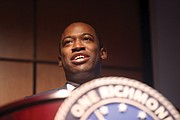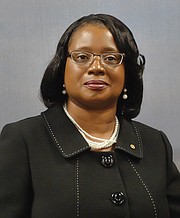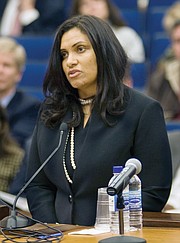New city protocol irritates City Council members
Jeremy M. Lazarus | 7/19/2019, 6 a.m.
A Downtown restaurant preparing a weekend banquet for 250 people suddenly faced disaster when the water was cut off while street work went on nearby. Seeking help to get the service restored, the restaurant made a call to the area’s City Council representative, who started dialing city officials. Councilwoman Kim B. Gray, 2nd District, finally was able reach a deputy director of the city Department of Public Utilities who handled the situation.
That’s not an unusual scenario for Richmond City Council members who often get requests from constituents frustrated, upset or even frightened about problems ranging from an alley blocked by trash to a tree on city property that has crashed into their home.
No more.
The days of council members speaking directly to department directors and other City Hall staff to resolve a problem are over. In early June, Mayor Levar M. Stoney and his No. 2, Selena Cuffee-Glenn, the city’s chief administrative officer, cut the lines of communications between City Council members and City Hall staff. Instead, the nine elected officials have been told that all communications, inquiries or appeals for help must be routed to Ms. Cuffee-Glenn’s office.
In addition, council members have been told they must file all requests for service through the RVA311 system. Directors and lower-level staff have been ordered to rebuff any calls from council members seeking assistance, with threats of discipline if they disobey, sources said. Neither Mayor Stoney nor Ms. Cuffee-Glenn responded to requests for comments on what is being called a sea change in the city’s communications protocol, which sources said includes monitoring employee email to ensure compliance.
Ms. Gray is upset at what she considers a misreading of the City Charter, which bars council members from giving orders to or direction to city employees and requires them to go through the CAO.
“The charter includes an exception. We are allowed for the ‘purpose of inquiry’ to contact departments,” Ms. Gray said. “We should be able to ask for status updates and notify departments of safety, health and other concerns that need to be addressed.” But instead, Ms. Gray said she is receiving responses from employees stating that they cannot take her calls and are under strict orders to adhere to the communication protocol now in effect.
“This has definitely slowed down the response to requests for information,” said 4th District Councilwoman Kristen N. Larson. “We’re just trying to get things done. Filtering everything through one person in the CAO’s office is not efficient.” Ms. Larson also noted the policy change has severed ties between longtime employees who work either for the council or the administration. “They can no longer communicate,” she said. “By the time someone contacts us (for help), they’ve been through a litany of people and processes. They don’t usually start with the City Council rep. They come to us for a problem that has not been dealt with. To require them to circle back to RVA311 is ridiculous.”
Councilman Michael J. Jones, 9th District, said he has not found the policy change irksome. “This is all about the process,” he said. The change, Dr. Jones said, means that everyone is treated equally when it comes to city services and addressing problems. He said the new policy ends the privileged access and preferential treatment some people have received by having a connection with a council member. He said that each council member has had a monthly opportunity to raise district concerns since Mayor Stoney took office, and there is generally a council meeting twice a month to raise service issues. Dr. Jones said the mayor, the CAO and the council need to work together to ensure a system is in place for communication so emergencies like the one the restaurant faced can be addressed quickly.
Some council members have Ms. Cuffee-Glenn’s cell phone numbers to report emergencies; others said they do not.Councilwoman Reva M Trammell, 8th District, sees the policy as a significant burden. She is used to sending direct invitations to city officials to speak at her monthly district meetings with constituents. She said she finds it bizarre that the invitations now have to go through Ms. Cuffee-Glenn’s office. “This is just not right,” she said.
Councilman Chris A. Hilbert, 3rd District, considers it “practical and orderly” to have inquiries on the status of issues go through the CAO as well as compliant with the charter. Still, he finds the requirement to file constituents’ requests for service on RVA311 “burdensome.”
“It slows down response time to constituents,” he said, noting that all requests do not fit neatly into 311. He views the policy shift as another reason why Richmond’s mayor-CAO-council form of government needs to be junked.
“Any administration needs to be accountable to the council and the people who elected us,” he said. But the administration is accountable to the CAO, who is only accountable to the mayor, he said.
After 14 years, he said this unique form of government in Virginia has demonstrated that “there is little incentive for the mayor to be cooperative with council.
“I voted for a change 17 years ago because I believed that council and the mayor working together would make better decisions through the marketplace of ideas,” Mr. Hilbert said. “That has not happened. Any project that has been given the opportunity of 14 years to work and hasn’t, it’s time for a change.”











